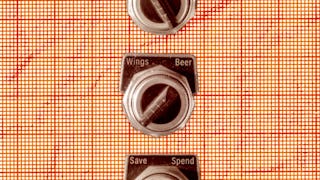Most people make the incorrect assumption that economics is ONLY the study of money. My primary goal in this course is to shatter this belief. During this course, we will be addressing the above questions as well as many more relating to:

Early bird sale! Unlock 10,000+ courses from Google, IBM, and more for 50% off. Save today.


Microeconomics Principles
This course is part of Microeconomics Principles Specialization

Instructor: Dr. José J. Vázquez-Cognet
192,682 already enrolled
Included with 
(3,223 reviews)
Recommended experience
What you'll learn
Identifying hidden costs of anything
Skills you'll gain
Details to know

Add to your LinkedIn profile
3 assignments
See how employees at top companies are mastering in-demand skills

Build your subject-matter expertise
- Learn new concepts from industry experts
- Gain a foundational understanding of a subject or tool
- Develop job-relevant skills with hands-on projects
- Earn a shareable career certificate

There are 3 modules in this course
You will become familiar with the course, your classmates, and our learning environment. The orientation will also help you obtain the technical skills required for the course.
What's included
1 video4 readings1 assignment1 discussion prompt1 plugin
Welcome to your first week in Microeconomics Principles! As you will quickly see, the things you learn in this class will probably help you see the world in a different way. Economics is not just about money, as you may have incorrectly assumed. On the contrary, as you will learn in this lesson, economics is about how society distributes scarce resources. And, since almost anything in the world is a scarce resource, from fossil fuels to suitable romantic partners, we can apply the rules of economics to pretty much anything.
What's included
6 videos1 reading1 assignment1 discussion prompt
Welcome to your second week in Microeconomics Principles! This module we will cover the hallmark framework of the field: the supply and demand model. I am sure that if you knew any economics words before enrolling in this course those two words were supply and demand. This module you will finally learn what all the fuss is about.
What's included
17 videos1 reading1 assignment1 discussion prompt1 plugin
Earn a career certificate
Add this credential to your LinkedIn profile, resume, or CV. Share it on social media and in your performance review.
Instructor

Offered by
Explore more from Economics
 Status: Free Trial
Status: Free Trial
University of Illinois Urbana-Champaign
 Status: Free Trial
Status: Free Trial
University of Illinois Urbana-Champaign


O.P. Jindal Global University
 Status: Free Trial
Status: Free Trial
Rice University
Why people choose Coursera for their career




Learner reviews
3,223 reviews
- 5 stars
82.30%
- 4 stars
14.56%
- 3 stars
1.45%
- 2 stars
0.55%
- 1 star
1.11%
Showing 3 of 3223
Reviewed on Nov 9, 2019
Very interesting course and easy to follow. It gives a lot of stimuli for parallel discussions.I really enjoyed it.Very good for a beginner that does not have a previous background in economics.
Reviewed on Jan 25, 2021
Highly engaging course with questions, real-life examples, and discussion prompts. I would recommend this course for anyone looking for an introduction to microeconomics.
Reviewed on Mar 13, 2019
It's a very well made course. Special thanks to Dr Jose for conveying the fundamentals of Microeconomics in such a lucid and simple way which helps in developing a solid intuition for the subject. :)

Open new doors with Coursera Plus
Unlimited access to 10,000+ world-class courses, hands-on projects, and job-ready certificate programs - all included in your subscription
Advance your career with an online degree
Earn a degree from world-class universities - 100% online
Join over 3,400 global companies that choose Coursera for Business
Upskill your employees to excel in the digital economy
Frequently asked questions
Access to lectures and assignments depends on your type of enrollment. If you take a course in audit mode, you will be able to see most course materials for free. To access graded assignments and to earn a Certificate, you will need to purchase the Certificate experience, during or after your audit. If you don't see the audit option:
The course may not offer an audit option. You can try a Free Trial instead, or apply for Financial Aid.
The course may offer 'Full Course, No Certificate' instead. This option lets you see all course materials, submit required assessments, and get a final grade. This also means that you will not be able to purchase a Certificate experience.
When you enroll in the course, you get access to all of the courses in the Specialization, and you earn a certificate when you complete the work. Your electronic Certificate will be added to your Accomplishments page - from there, you can print your Certificate or add it to your LinkedIn profile. If you only want to read and view the course content, you can audit the course for free.
If you subscribed, you get a 7-day free trial during which you can cancel at no penalty. After that, we don’t give refunds, but you can cancel your subscription at any time. See our full refund policy.
More questions
Financial aid available,

